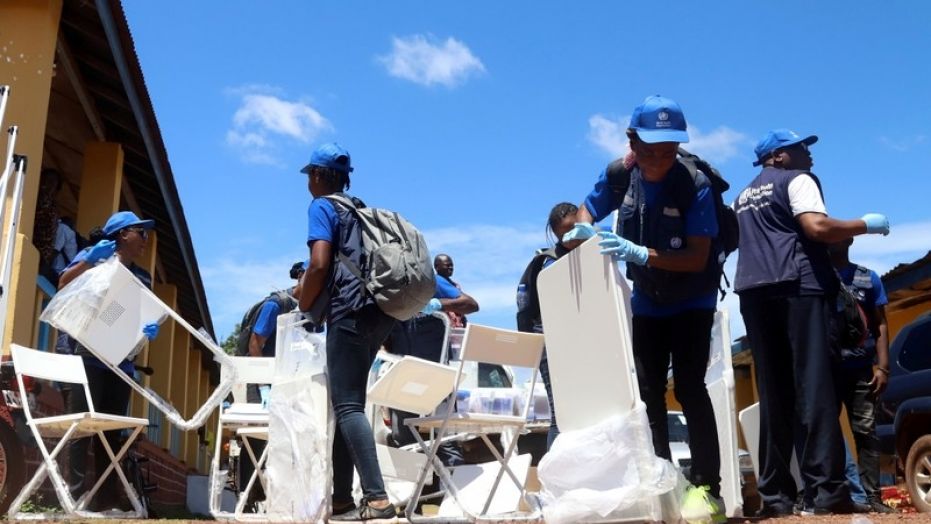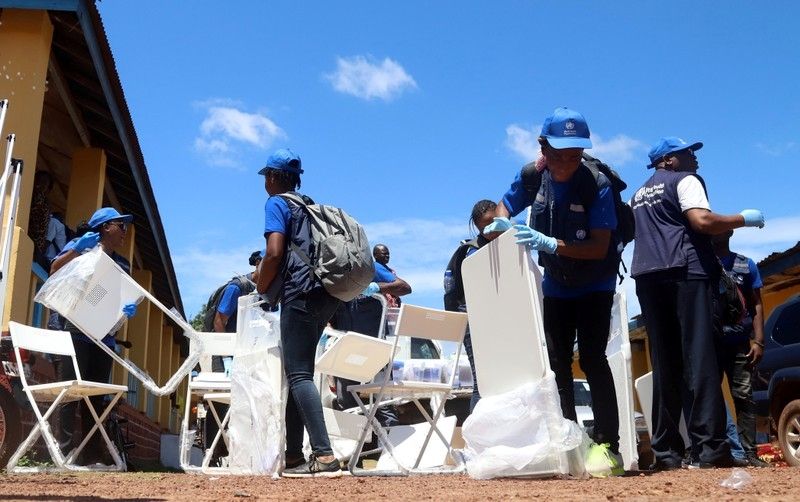[ad_1]

World Health Organization workers prepare a centre for vaccination in the port city of Mbandaka
(Copyright Reuters 2018)
MBANDAKA – Three patients infected with the Ebola virus slipped out of an isolation ward at a hospital in the Congolese city of Mbandaka, health officials said, as medics raced to stop the deadly disease from spreading in the busy river port.
The cases represent a setback to costly efforts to contain the virus, including the use of an experimental vaccine, and show efforts to stem its spread can be hampered by age-old customs or scepticism about the threat it poses.
Two patients left the hospital on Monday night with the help of family members, then headed to a church, the World Health Organization’s spokesman in Congo, Eugene Kabambi, told Reuters.
NHL PROSPECT HORRIFIED TO FIND 2-FOOT TAPEWORM WAS INSIDE HIM DURING SEASON
One died at home the next day and was buried with the help of medical charity Medecins Sans Frontieres (MSF). The other was sent back to hospital and died that night, Kabambi said.
Health Ministry sources, who asked not to be named, said two police officers had been deployed to help track them down.
Another patient who was close to being discharged left on Sunday evening but was later found, Kabambi said.
The WHO and MSF said they could not force patients to stay in hospital but hoped that growing awareness of the disease and its risks would convince people to follow medical advice.
“This is a hospital. It’s not a prison. We can’t lock everything,” Henry Gray, the head of the MSF mission in Mbandaka, told Reuters.
WHO spokesman Tarik Jasarevic said health workers had redoubled efforts to trace contacts with the patients. Health workers have drawn up a list of 628 people who have had contact with known cases who will need to be vaccinated.
“It is unfortunate but not unexpected,” he said. “It is normal for people to want the loved ones to be at home during what could be the last moments of life.”
TENNESSEE MOM WHO GAVE BIRTH WHILE IN A COMA DIES 3 YEARS AFTER WAKING
The report came as another WHO official warned that the fight to stop Democratic Republic of Congo’s ninth confirmed outbreak of Ebola had reached a critical point.
“The next few weeks will really tell if this outbreak is going to expand to urban areas or if we’re going to be able to keep it under control,” WHO’s emergency response chief, Peter Salama, said at the U.N. body’s annual assembly. “We’re on the epidemiological knife edge of this response.”
KINSHASA FEARS
Health officials are particularly concerned by the disease’s presence in Mbandaka, a crowded trading hub upstream from Kinshasa, a city of 10 million people. The river runs along the border with the Republic of Congo.
The WHO said health officials received an alert on Wednesday from Kinshasa’s main hospital, but the health ministry said later that it was a false alarm.
The outbreak, first spotted near the town of Bikoro, about 100 km (60 miles) south of the city, is believed to have killed at least 27 people so far.
The WHO said health workers were following up on three separate transmission chains for cases in Mbandaka’s Wangata neighborhood – one linked to a funeral, one to a church and another to a rural health facility.
“It’s really the detective work of epidemiology that will make or break the response to this outbreak,” Salama said.
The disease was first discovered in Congo in the 1970s. It is spread through direct contact with body fluids from an infected person, who suffers severe bouts of vomiting and diarrhea.
More than 11,300 people died in an Ebola outbreak in the West African countries of Guinea, Liberia and Sierra Leone between 2013 and 2016.
[ad_2]
Source link

